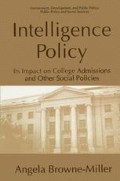Abstract
As Gifford contends, decision makers need a mechanism to assist in making difficult decisions regarding the allocation of opportunity. It is suggested herein that a special form of impact analysis be used to extract, and make more explicit, the powerful tensions inherent in the implicit intelligence policy behind explicit college admissions and other policies. Although this mechanism will not necessarily resolve the many difficulties of opportunity allocation, it will force the specification, even illumination, of the biases that drive policy and its outcome. Greater control over the effects of these biases should result.
People are different from one another in ways that are both meaningful and measurable. But somehow, without sufficient deliberation, we have taken a great collective leap from the commonplace belief to the conviction that there are precise, measurable graduations of ability (and stability) that can be used to send children to the right classrooms, adults to the right job slots, and patients to the right psychological interventions.
Decision-makers need a sound, fair, and reasonably efficient mechanism to help them make difficult decisions about the allocation of opportunity among individuals and institutions. In many circumstances, standardized tests serve a useful role. Certainly, people have different abilities and skill levels. Another way to say this is that life is not fair. But that does not relieve us of the burden of being as fair as we can possibly be as we measure differences and assign meaning to them.
Bernard R. Gifford [1]
Access this chapter
Tax calculation will be finalised at checkout
Purchases are for personal use only
Preview
Unable to display preview. Download preview PDF.
Notes
Gifford, B. R.(1992). The learning society: On Ellis Island.Education Week, February12, p. 17.
Committeeon Admissions and Enrollment (1989).Freshman Admissions at Berkeley: APolicy for the 1990s and Beyond (The Karabel Report). Berkeley, CA:Berkeley Division, Academic Senate, University of California.
Author information
Authors and Affiliations
Rights and permissions
Copyright information
© 1995 Springer Science+Business Media New York
About this chapter
Cite this chapter
Browne-Miller, A. (1995). Recommendations and Conclusions. In: Intelligence Policy. Environment, Development, and Public Policy. Springer, Boston, MA. https://doi.org/10.1007/978-1-4615-1865-5_13
Download citation
DOI: https://doi.org/10.1007/978-1-4615-1865-5_13
Publisher Name: Springer, Boston, MA
Print ISBN: 978-1-4613-5758-2
Online ISBN: 978-1-4615-1865-5
eBook Packages: Springer Book Archive

